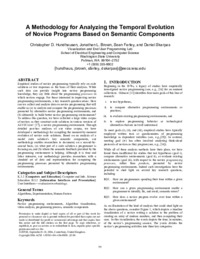A methodology for analyzing the temporal evolution of novice programs based on semantic components Publikationsdatum:
Zu finden in: ICER 2006 (Seite 59 bis 71), 2006
|
 |
 Diese Seite wurde seit 3 Jahren inhaltlich nicht mehr aktualisiert.
Unter Umständen ist sie nicht mehr aktuell.
Diese Seite wurde seit 3 Jahren inhaltlich nicht mehr aktualisiert.
Unter Umständen ist sie nicht mehr aktuell.
 Zusammenfassungen
Zusammenfassungen
Empirical studies of novice programming typically rely on code solutions or test responses as the basis of their analyses. While such data can provide insight into novice programming knowledge, they say little about the programming processes in which novices engage. For those interested in improving novice programming environments, a key research question arises: How can we collect and analyze data on novice programming that will enable us (a) to analyze and compare the programming processes promoted by alternative novice programming environments, and (b) ultimately to build better novice programming environments? To address this question, we have collected a large video corpus of novices as they construct code solutions in various versions of ALVIS Live! [17], a novice programming environment. Through detailed post-hoc analyses of our video corpus, we have developed a methodology for compiling the moment-by-moment evolution of novice code solutions. Based on an analysis of a model code solution's key semantic components, our methodology enables researchers to document, on a second-by-second basis, (a) what part of a code solution a programmer is focusing on, and (b) where the semantic feedback provided by the programming environment is helping. Although it is time and labor intensive, our methodology provides researchers with a standard set of data and representations for comparing the programming processes promoted by alternative programming environments.
Von Christopher D. Hundhausen, Jonathan Lee Brown, Sean Farley, Daniel Skarpas im Konferenz-Band ICER 2006 im Text A methodology for analyzing the temporal evolution of novice programs based on semantic components (2006)  Dieses Konferenz-Paper erwähnt ...
Dieses Konferenz-Paper erwähnt ...
 Begriffe KB IB clear |  Programmieren Programmieren programming programming
|
 Zitationsgraph (Beta-Test mit vis.js)
Zitationsgraph (Beta-Test mit vis.js)
 1 Erwähnungen
1 Erwähnungen 
- DeLFI 2017 (Christoph Igel, Carsten Ullrich, Martin Wessner) (2017)


- Metriken zur Messung von Lernerfolg im Informatik-Grundlagen-Unterricht (Simon Rupp, René Pawlitzek, Carlo Bach)


- Metriken zur Messung von Lernerfolg im Informatik-Grundlagen-Unterricht (Simon Rupp, René Pawlitzek, Carlo Bach)
 Anderswo finden
Anderswo finden
 Volltext dieses Dokuments
Volltext dieses Dokuments
 |  A methodology for analyzing the temporal evolution of novice programs based on semantic components: Fulltext at the ACM Digital Library ( A methodology for analyzing the temporal evolution of novice programs based on semantic components: Fulltext at the ACM Digital Library ( : :  , 310 kByte; , 310 kByte;  : :  Link unterbrochen? Letzte Überprüfung: 2020-11-28 Letzte erfolgreiche Überprüfung: 2020-10-28) Link unterbrochen? Letzte Überprüfung: 2020-11-28 Letzte erfolgreiche Überprüfung: 2020-10-28) |
 Anderswo suchen
Anderswo suchen 
 Beat und dieses Konferenz-Paper
Beat und dieses Konferenz-Paper
Beat hat Dieses Konferenz-Paper während seiner Zeit am Institut für Medien und Schule (IMS) ins Biblionetz aufgenommen. Beat besitzt kein physisches, aber ein digitales Exemplar. Eine digitale Version ist auf dem Internet verfügbar (s.o.). Aufgrund der wenigen Einträge im Biblionetz scheint er es nicht wirklich gelesen zu haben. Es gibt bisher auch nur wenige Objekte im Biblionetz, die dieses Werk zitieren.










 Biblionetz-History
Biblionetz-History